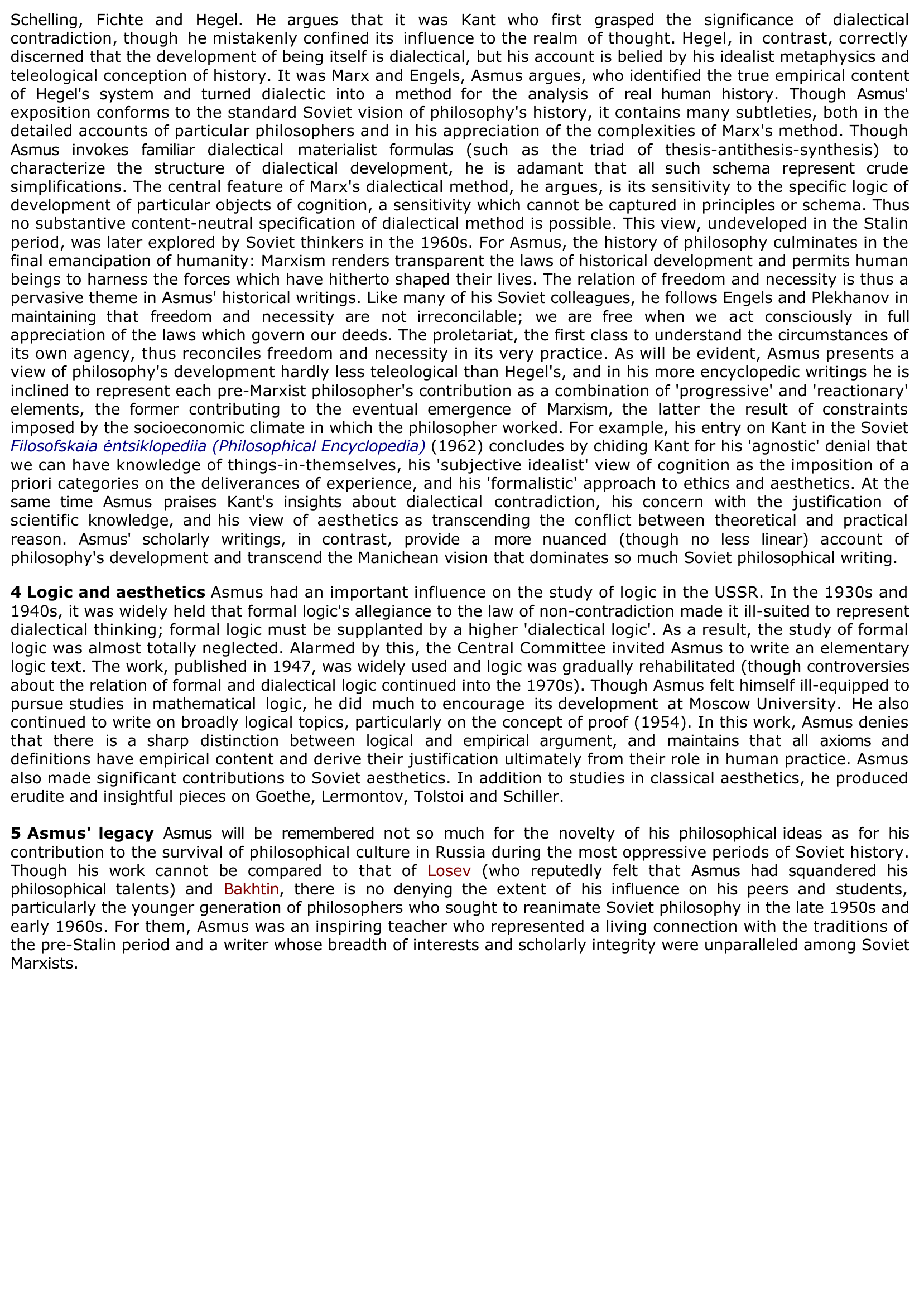Asmus, Valentin Ferdinandovich
Publié le 22/02/2012

Extrait du document
«
Schelling, Fichte and Hegel.
He argues that it was Kant who first grasped the significance of dialecticalcontradiction, though he mistakenly confined its influence to the realm of thought.
Hegel, in contrast, correctlydiscerned that the development of being itself is dialectical, but his account is belied by his idealist metaphysics andteleological conception of history.
It was Marx and Engels, Asmus argues, who identified the true empirical contentof Hegel's system and turned dialectic into a method for the analysis of real human history.
Though Asmus'exposition conforms to the standard Soviet vision of philosophy's history, it contains many subtleties, both in thedetailed accounts of particular philosophers and in his appreciation of the complexities of Marx's method.
ThoughAsmus invokes familiar dialectical materialist formulas (such as the triad of thesis-antithesis-synthesis) tocharacterize the structure of dialectical development, he is adamant that all such schema represent crudesimplifications.
The central feature of Marx's dialectical method, he argues, is its sensitivity to the specific logic ofdevelopment of particular objects of cognition, a sensitivity which cannot be captured in principles or schema.
Thusno substantive content-neutral specification of dialectical method is possible.
This view, undeveloped in the Stalinperiod, was later explored by Soviet thinkers in the 1960s.
For Asmus, the history of philosophy culminates in thefinal emancipation of humanity: Marxism renders transparent the laws of historical development and permits humanbeings to harness the forces which have hitherto shaped their lives.
The relation of freedom and necessity is thus apervasive theme in Asmus' historical writings.
Like many of his Soviet colleagues, he follows Engels and Plekhanov inmaintaining that freedom and necessity are not irreconcilable; we are free when we act consciously in fullappreciation of the laws which govern our deeds.
The proletariat, the first class to understand the circumstances ofits own agency, thus reconciles freedom and necessity in its very practice.
As will be evident, Asmus presents aview of philosophy's development hardly less teleological than Hegel's, and in his more encyclopedic writings he isinclined to represent each pre-Marxist philosopher's contribution as a combination of 'progressive' and 'reactionary'elements, the former contributing to the eventual emergence of Marxism, the latter the result of constraintsimposed by the socioeconomic climate in which the philosopher worked.
For example, his entry on Kant in the SovietFilosofskaia ėntsiklopediia (Philosophical Encyclopedia) (1962) concludes by chiding Kant for his 'agnostic' denial that we can have knowledge of things-in-themselves, his 'subjective idealist' view of cognition as the imposition of apriori categories on the deliverances of experience, and his 'formalistic' approach to ethics and aesthetics.
At thesame time Asmus praises Kant's insights about dialectical contradiction, his concern with the justification ofscientific knowledge, and his view of aesthetics as transcending the conflict between theoretical and practicalreason.
Asmus' scholarly writings, in contrast, provide a more nuanced (though no less linear) account ofphilosophy's development and transcend the Manichean vision that dominates so much Soviet philosophical writing.
4 Logic and aesthetics Asmus had an important influence on the study of logic in the USSR.
In the 1930s and 1940s, it was widely held that formal logic's allegiance to the law of non-contradiction made it ill-suited to representdialectical thinking; formal logic must be supplanted by a higher 'dialectical logic'.
As a result, the study of formallogic was almost totally neglected.
Alarmed by this, the Central Committee invited Asmus to write an elementarylogic text.
The work, published in 1947, was widely used and logic was gradually rehabilitated (though controversiesabout the relation of formal and dialectical logic continued into the 1970s).
Though Asmus felt himself ill-equipped topursue studies in mathematical logic, he did much to encourage its development at Moscow University.
He alsocontinued to write on broadly logical topics, particularly on the concept of proof (1954).
In this work, Asmus deniesthat there is a sharp distinction between logical and empirical argument, and maintains that all axioms anddefinitions have empirical content and derive their justification ultimately from their role in human practice.
Asmusalso made significant contributions to Soviet aesthetics.
In addition to studies in classical aesthetics, he producederudite and insightful pieces on Goethe, Lermontov, Tolstoi and Schiller.
5 Asmus' legacy Asmus will be remembered not so much for the novelty of his philosophical ideas as for his contribution to the survival of philosophical culture in Russia during the most oppressive periods of Soviet history.Though his work cannot be compared to that of Losev (who reputedly felt that Asmus had squandered his philosophical talents) and Bakhtin , there is no denying the extent of his influence on his peers and students, particularly the younger generation of philosophers who sought to reanimate Soviet philosophy in the late 1950s andearly 1960s.
For them, Asmus was an inspiring teacher who represented a living connection with the traditions ofthe pre-Stalin period and a writer whose breadth of interests and scholarly integrity were unparalleled among SovietMarxists..
»
↓↓↓ APERÇU DU DOCUMENT ↓↓↓
Liens utiles
- VOILE AU LOIN (Une) de Valentin Pétrovitch Kataev (résumé)
- VALENTIN Raphaël de. Personnage du roman d’Honoré de Balzac la Peau de chagrin
- QUADRATURE DU CERCLE (La) Valentin Kataev (résumé)
- Le personnage de VAN BUCK Valentin d’Alfred de Musset
- CONCUSSIONNAIRES (Les) Valentin Petrovitch Kataev (résumé)

































